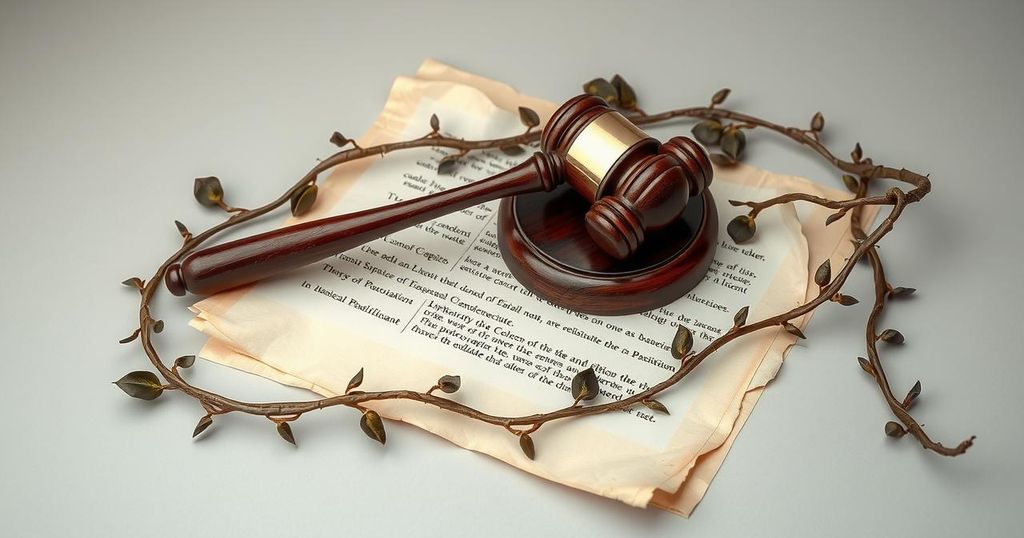As Cameroon nears its elections, President Paul Biya, age 91, may seek an eighth term, raising concerns over his health and ability to govern effectively. Despite significant opposition, including civil unrest and economic stagnation, his party claims strong support for him. The fragmented political landscape offers no substantial alternatives, complicating the country’s future prospects under his continued leadership.
As Cameroon approaches its upcoming elections, the presence of 91-year-old President Paul Biya on the ballot for an eighth consecutive term seems likely. Dr. John Akpo, a local political analyst, affirms that there is little doubt concerning Biya’s candidacy, despite worrying health issues surrounding him. His party has already expressed strong motions of support for his continued leadership, indicating a cohesive effort in his favor.
Despite Biya’s age, he has been a dominant figure in Cameroonian politics for over 42 years, and if re-elected, he would be 99 years old by the next election cycle in 2032. Interestingly, some opposition parties have publicly supported Biya, but Akpo questions the authenticity of these endorsements, suggesting they are merely derivative of the ruling party’s influence.
Biya is oftentimes credited for facilitating multi-party democracy and enhancing ties with Western nations. However, he has faced substantial criticism due to the ongoing civil conflict spurred by Anglophone separatists, which has plagued the nation and hindered economic advancement. Tamfu Richard, an opposition lawyer, emphasizes that Biya’s age severely limits his ability to engage directly with the escalating crises effectively.
Additionally, the Biya administration has frequently suppressed political dissent, as evidenced by the imprisonment of peaceful demonstrators, including high-profile opposition leader Maurice Kamto, who was incarcerated for nine months after the last elections. This trend showcases a troubling approach toward governance under Biya’s leadership.
The ruling Cameroon People’s Democratic Movement (CPDM) achieves stability through alliances with other parties, notably the Democratic Movement for the Defense of the Republic (MDR). However, their support has diminished, complicating Biya’s political landscape, especially against the backdrop of rising opposition figures like Kamto and indications of nepotism with Biya’s son, Franck Biya, gaining political visibility.
In a recent gathering, Catholic bishops have voiced concerns regarding the socio-political climate and advocated for improved living conditions for citizens, evoking mixed reactions from government officials regarding calls for political change. These discussions resonate with the influential position of the Catholic Church in predominantly Catholic Cameroon.
Economically, Cameroon has recently shown signs of recovery, with a slight uptick in GDP growth despite significant challenges such as inflation and ongoing structural issues. Nevertheless, poverty levels remain alarmingly high, with many citizens struggling to meet basic needs, while corruption remains rampant throughout the government.
As Cameroon wrestles with these multifaceted issues, questions about Biya’s effectiveness as president at 91 years old linger. The fragmentation within the opposition and their inability to present viable alternatives suggest a continuation of the current regime’s existing dynamics. Lawyer Michele Ndoki summarizes the sentiment of many, questioning Biya’s capability to fulfill his responsibilities as head of state effectively.
Cameroon is set for elections that might see the re-election of President Paul Biya, who has governed for 42 years. His leadership has drawn both support and criticism, especially regarding how health and age affect his ability to govern amidst growing social unrest and economic challenges. The country’s political landscape is fragmented, making it difficult for opposition forces to emerge as viable alternatives to Biya’s longstanding rule.
In summary, President Paul Biya’s potential candidacy showcases a political landscape characterized by longstanding dominance, suppression of dissent, and a fragmented opposition. Despite criticisms about his ability to lead at such an advanced age, the internal divisions among opposition parties leave many Cameroonians questioning their next steps. The influence of various political and societal factions continues to shape the current trajectory leading towards the elections.
Original Source: www.dw.com






